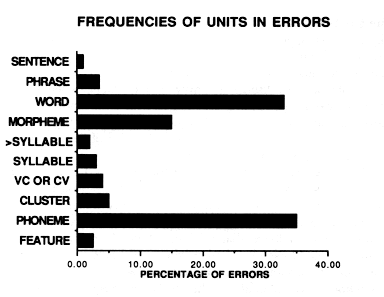May 05, 2007
The Eternal General of the United States?
No, it only seems that way, recently. And the White House transcript says "attorney general" ("President Bush Celebrates Cinco de Mayo, Discusses Immigration", 5/4/2007):
I'm honored to be here with the Attorney General of the United States, mi amigo, Alberto Gonzales.
But in the recording, President Bush's pronunciation clearly evokes a different word:
This is clearly a slip of the tongue.
In pronouncing Attorney, the president anticipated the final syllable of the following word, General. So what he actually said, in a very broad phonetic transcription, was something like [ði.ɪˈtʰɚ.nəl ˈdʒɛ.nɚ.rəl] when he meant to say [ði.ɪˈtʰɚ.niˈdʒɛ.nɚ.rəl], with the syllable nucleus [əl] subsituted for [i]. (In fact, the pronunciation of "General" was substantially more reduced, but that's another story.) The rest of the word Attorney, including the relatively high and front rendition of the initial vowel, was pronounced just as President Bush (and many others) would normally pronounce it in the context "the ___ General".
That's the mechanism of the error -- a simple anticipation that substituted the rhyme of the last syllable of General for the corresponding part of the last syllable of Attorney. This VC substitution (that's Vowel+Consonant, not Venture Capitalist) is one of the rarer types of speech errors, purely from the formal point of view, as this bar graph taken from a review article on speech errors (via my Ling001 lecture notes) indicates:

Such errors certainly occur, though -- for example, "milestorms and norms" for "milestones and norms".
But what's rarer still is that this appears to be a classical "Freudian slip", that is, a case where we can tell a plausible story about how the speaker's unconscious fears or desires have subverted the speech production mechanism in order to allow themselves to be expressed. Freud wrote ("The Psychopathology of Everyday Life", 1901, chap. 5) that
I do not doubt the laws whereby the sounds produce changes upon one another; but they alone do not appear to me sufficiently forcible to mar the correct execution of speech. In those cases which I have studied and investigated more closely they merely represent the preformed mechanism, which is conveniently utilized by a more remote psychic motive. The latter does not, however, form a part of the sphere of influence of these sound relations. In a large number of substitutions caused by mistakes in talking there is an entire absence of such phonetic laws. [...] [And] I still cherish the expectation that even the apparently simple of speech-blunder will be traced to a disturbance caused by a half-repressed idea ...
In fact, in the large corpora of speech errors that have been collected, the cases where there is any obvious or even plausible account in term of "half-repressed ideas" are very rare, and an account in terms of simple speech production glitches, without reference to unconsious fears and desires, has been preferred by modern psychologists. Certainly, we can create obviously non-Freudian speech errors by simple experimental manipulations, as anyone knows who has ever tried to say "rubber baby buggy bumpers" 5 times fast.
Still, every once in a while, there's a case that makes you wonder whether ol' Sigmund wasn't on to something after all.
[I'm not in general a supporter of the Bushisms industry. The point of this post is not that President Bush is especially prone to spoonerisms. I haven't seen any counts -- as far as I know, no one has ever made any -- but I suspect that the rate of such errors in his public speaking is within the range exhibited by other politicians, and probably not all that different from my own rate in public speaking.]
Posted by Mark Liberman at May 5, 2007 02:51 PM